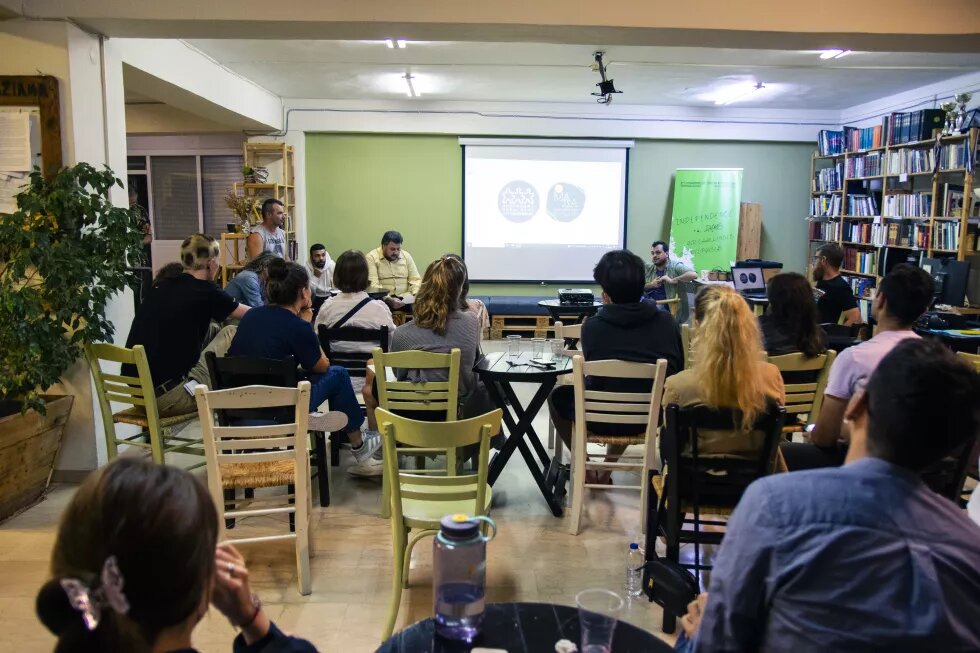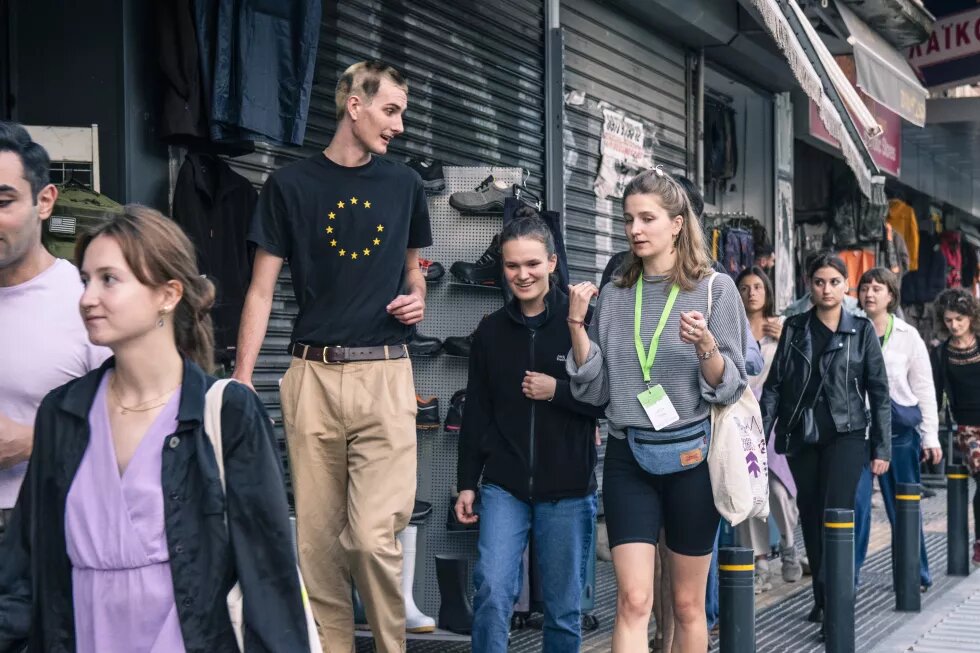
A different tour of the western side of Thessaloniki was made by young people from all over Europe who came to Greece to participate in the 8th Congress of Young Europeans organised by the Heinrich Böll Foundation, Thessaloniki office, on 19-22 October 2023. The participants of the tour saw parts of the city through the eyes of cooperative Social Solidarity Economy and neighbourhood initiatives that sprang up during the crisis as a collective effort to meet needs in a participatory and democratic way of decision making. At the same time, they got to know the people behind some of these initiatives and explored neighbourhoods in the western and central municipality of Thessaloniki that are changing in the context of urban gentrification and touristification of the city. They thus had the opportunity to find out stories behind walls and buildings, as well as about the memory that neighbourhood initiatives are collectively trying not to be lost.

First stop: From Point Zero to the present day
Our meeting took place at the city's ‘Point Zero’ in Vardaris, namely the point from which all kilometric distances to other cities are calculated. There, members of the cooperative news portal Alterthess talked about their initiative, which for 12 years has been highlighting news and events that get lost in the daily coverage of the mainstream media. Theophilos from Alterthess explained the reasons why movements against impoverishment of the Greek population and austerity measures were unable to find a voice in the media at the beginning of the economic crisis, when new rules and measures through the so-called Memoranda were imposed in Greece. Thus, the initial idea of creating a local site with news from below and for those who are below turned into an Employee Cooperative that today, under the legal form of a Social Cooperative Enterprise, tries to contribute with texts, videos, images and podcasts to an information away from the nationalist narrative of the city. At the same time, it daily highlights stories of people, movements and neighbourhoods fighting against racism, for the rights of refugees and the LGBTQI+ community, for the environment and for the right to work with dignity.
Moving on to the Vardaris neighbourhood, the participants of the tour had the opportunity to see traces of a multicultural neighbourhood where mainly people of the Jewish community lived in the early 20th century and later refugees from Asia Minor. There were factories and later small industries in the area, which became known for the flourishing of rebetiko music. Today, the neighborhood is experiencing huge changes in the uses of its buildings that are being driven towards tourism.
Second stop: The mad pomegranate tree
Hidden in the alleys of Vardaris is a self-help community dealing with the issue of addictions, whose activities in recent years have been seeking the artistic and musical memories of the area in an effort to highlight its history.
This is the Self-Help Promotion Programme, a research project of the Department of Psychology of the Aristotle University of Thessaloniki. As reported by Giorgos Melissourgos, coordinator of the Social Solidarity Economy Programme at the Heinrich Böll Foundation, and then by the members of the Self-Help Promotion Programme themselves, the programme supports people facing addiction problems, as well as members of their family and friends. It focuses on the social reintegration process, is open and free of charge, without waiting lists or the use of substitutes. Through this programme two communities of the Social Solidarity Economy have been born. The first is the ‘Vardaris Neighbourhood Group’, which operates in the area mapping the current challenges in collaboration with residents as well as people working in the area. The second is a community of agricultural and organic farming called ‘The Mad Pomegranate Tree’ (after a poem by the Nobel laureate Greek poet Odysseus Elytis).
The members of the projects themselves presented these actions in a very moving atmosphere of sharing experiences. Among others, Dimitris mentioned the history of the ‘Vardaris Neighborhood Group’ from its first steps in 2018 and the first event held with the participation of the author Thomas Korovinis, in whose books the historical Vardaris has a prominent place. The Group made its aims known to students at many events in the city, including at the Aristotle University. One of the main activities of the initiative is the publication of calendars with visual, literary and musical anthologies, in collaboration with artists, writers and musicians in the city. The calendars were presented in previous years at successful events with the participation of artists and friends of the neighbourhood. The ‘Vardaris Neighborhood Group’ has payed tribute to the victims of the Jewish community during World War II with a mural in the area of the New Railway Station, recounting unspoken events in its history.
A recent action of the Programme concerning the Social Solidarity Economy was presented in this different tour: It’s ‘The Mad Pomegranate Tree’, which is mainly dealing with agro-farming and organic farming. Kostas, a member of both the Programme and this new project, mentioned the main purpose of the group, which is to get in touch with the land and the food. ‘Imagine someone quitting drugs and from the next day being in a peaceful environment in nature. Feeling truly free is something very creative and helpful. We are being trained in agro-farming and it is an opportunity for us to put into practice all that we have learned: cooperation, solidarity, consistency and commitment’, he noted. The effort of the members of the Self-Help Promotion Programme to connect with the land had already begun in 2008 in a farm granted by the Aristotle University near the airport, and continued in 2017 in the former ‘Karatasou’ military camp in a farm that was under occupation. During the pandemic, members of the Programme started seminars with the agro-farmer Nikos Misyrlis at his farm in Vasilika, who for years has been engaged in the multiplication of plant matter on herbs, vegetables, etc., as well as in processing products and selling them. The theory was then put into practice on a neighbouring rented farm, when members of the Programme started cultivating 420 pomegranate trees. The idea of the two activities working together matured and it was decided to merge them. Already under consideration and elaboration is the creation of a Social Cooperative Enterprise that will support both the therapeutic component and the seasonal work of Programme members. The next goal of the group is to help those who wish to make a longer-term commitment, with a view to their professional rehabilitation. Particularly moving was the inspiration for the name of the action from the poem of the same name by Odysseus Elytis which captures their effort, as was said.
tell me
Is it the mad pomegranate tree that combats the cloudy skies of the world?
The members of the Self-Help Promotion Programme completed the presentation of their activities with a tour of three murals, which were made on their own initiative and in collaboration with artistic groups. One, at the entrance of the Programme’s building, is about people’s life and activities in the neighbourhood during the German Occupation in World War II. Right opposite is another one that commemorates ‘Regie’, a historical tobacco factory in the district. The third one pays tribute to the memory of the poet Dinos Christianopoulos, much of whose work and personal life is connected to Vardaris.
Third stop: Eklektik
Eklektik is a cooperative grocery-café that was created during the economic crisis as a result of many people realising that they have to do something about food, either as consumers or as producers. It is one of the four active cooperative food businesses in Greece. ‘The idea started in 2005 through the promotion of coffee grown by the Zapatistas in the Mexican state of Chiapas. For this purpose, they created the Cooperative Bypass of the Intermediary Parts, which lasted five years. In 2015 six of us decided to found Eklektik in order to sell products of cooperatives, small producers, organic and fair trade products, in an effort to have a basic income’, explained Stelios, a member of Eklektik. He stressed that this Social Cooperative Enterprise operates under the principles of self-management, everything is decided in the assembly, everyone works equally and is paid according to the hours worked. According to him, the aim of the project is to achieve the best quality in products, while ensuring their ethics and affordability. ‘We are a few cooperative businesses in the food sector. Our goal is to be sustainable. Many people who used to support the Cooperative Bypass of the Intermediary Parts have become customers of Eklektik, which is now supported by the neighbourhood and by people from many different areas as well as tourists’, he concluded. The delegates who toured the grocery store shared experiences and insights about similar cooperative initiatives in many countries and efforts to collectively redefine our relationship with food and the environment.
Last stop: dot2dot
It is a cooperative enterprise created in 2013 in Thessaloniki aiming to create and implement alternative thematic tours, educational activities, cultural events and workshops for children and adults. The five members of this Social Cooperative Enterprise use their expertise in the field of experiential tourism, culture, education and research in order to highlight the multicultural character of Thessaloniki, to talk about art and to promote the potential of the city and the region in tourism. As Christina from dot2dot said, ‘the aim of the initiative is to create experiences that will remain unforgettable in the memory of those who participate in them’. The main concern of the cooperative initiative is to become a reference point in alternative and experimental tourism, based on the principle that culture and education are everyone's right. About 8,000 people have participated in the actions of dot2dot for over a decade – citizens of Thessaloniki, tourists, children and families, businesses, schools and educational institutions, municipalities of the city of Thessaloniki, etc. As part of their actions, they provide special guided tours for young children, highlighting the Roman history of the city through comics such as ‘Asterix’. They also provide guided tours of archaeological sites and special programmes for people with disabilities, tailored to their needs. In dot2dot's medical tourism services they ensure that there is full accessibility to sightseeing tours, medical care, gastronomic visits. They also operate similar programmes in Crete.
Our walk was concluded with a short presentation by members of dot2dot and Alterthess of a joint effort with other local Social Solidarity Economy initiatives to build a creative economy hub in Thessaloniki. Seven cooperative enterprises – dot2dot, Infinity Greece, Alterthess, Photoomada, SolidarIT, Peer2Peer and the Educational Platform 'kalomathe' – met in a two-day workshop in the village of Rapsani and mapped their common needs and aspirations. At the same time, they made common conclusions on the issue of the Social Solidarity Economy and a different work paradigm under the principles of self-management, equality and collective decisions. They also arrived at the first steps of a comprehensive plan of collective action aimed at shaping a more equitable and just labour and economic reality, with a social footprint and control.




